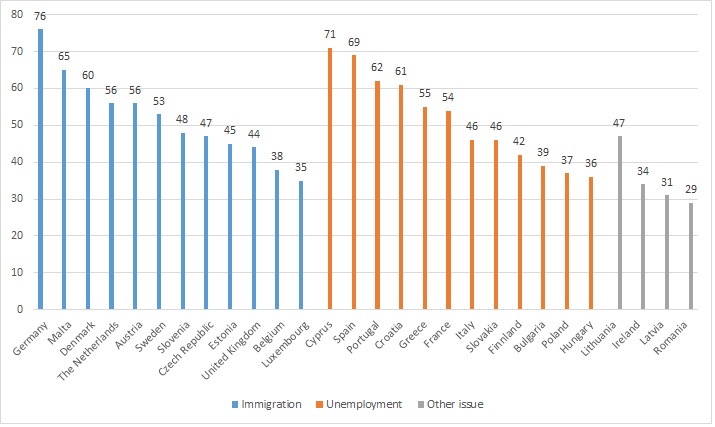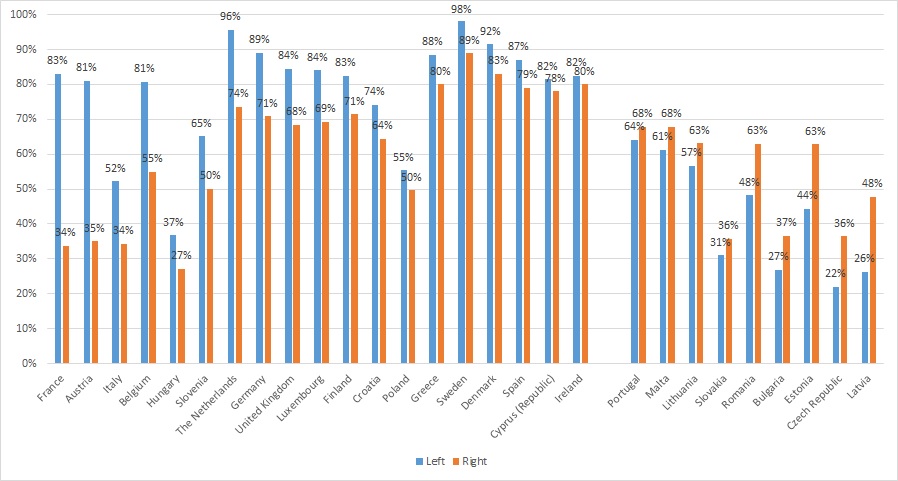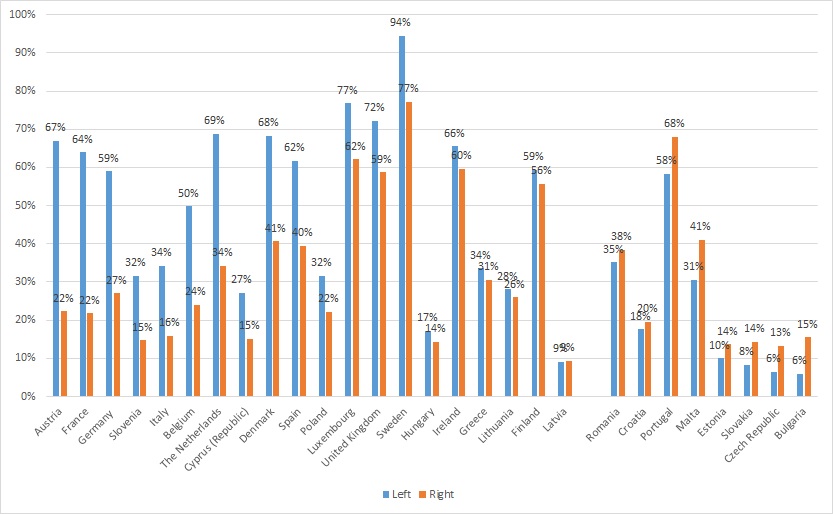The result of the Austrian presidential election is one of the rare cases showing pretty accurately how politically divided is the society. The difference between the winning Green and losing far-right candidates was less than 1%, which was 30 thousand votes. Although it was not the only moment when a moderate kind of resistance defeated the recently strengthened far-right, it was a more obvious victory for the moderates at the regional elections of France in December 2015 – despite the fact that, eventually, the candidates of the Republican Party of Sarkozy did not stand down so there were even competitors for moderate candidates.
Since the EU is facing the refugee crisis, electoral maps have significantly changed not only in Austria and France, but in Poland, Slovakia as well as in German regional elections. Although the Austrian political situation marks another milestone in the escalating the process, there is no sign of willingness to understand it to greater extent. The proposed idea of (financially) sanctioning countries not willing to accept refugees – as an addition to the concept of refugee quotas – does not answer the most important questions: what exactly are the responsibilities and obligations of the EU in this situation? There are two parallel debates going on in Europe: an ideological one about the role of Europe, and a technocratic one, about policy solutions proposed based on the first debate. And while many of the member states and their political parties try to win the first, the EU only seems to care about the second one.
The leaders of the EU should recognize that Europe is more and more dangerously divided by this schism, which is two-layered in fact. On one hand, the perception of what is the most important problem on a national level tears the two parts of Europe apart from one another: in 12 countries it is unemployment, and in 12 countries it is migration. This proves that while the refugee crisis indeed rearranged voter priorities on a European level, it did not overwrite the whole political field on a national level. A major part of European societies is most concerned about economic issues and unemployment.
Figure 1: What do you think are the two most important issues (OUR COUNTRY) is facing at the moment?
 Eurobarometer 84 (November 2015)
Eurobarometer 84 (November 2015)
This is also confirmed by the fact that the refugee crisis is hardly perceived as a problem on the individual level: only 9% of the European society named it as one of the two most important problems. This rate was specifically high, 20% in Germany, and higher than 15 % in Malta, Sweden and Austria, but was under 5% in 12 countries. Economic and financial difficulties are the most worrying issues in the lives of Europeans: 26% are concerned about inflation and rising prices, and almost 30% worry about pensions and the health care system. Should the EU only seem to be interested in resolving the refugee crisis while ignoring the cost-of-living problems, it will shove off from the voters. Additionally, the groups with decreasing living standards and in danger of losing their ground are more likely to be critical towards both the European integration and the refugees. The damage is done both directly and indirectly – and the EU should take it more seriously.
Economic difficulties can boost similar political changes that the refugee crisis did and it can end up in changing whole party systems. Elections in Greece or Spain (resulting in a deadlock so far) were not mainly dominated by the refugee crisis but the bad and not improving economic situation and unemployment. The European Union should pay attention to these issues too in order to have politically stable member states – which is indispensable for its long-term success.
On the other hand, we face the polarization of the left and right wing political communities and whole societies – and the refugee crisis shows this clearly. The two political ideologies tend to perceive certain issues differently. It is natural – as long as different parties are able to discuss them and in critical moments so that they are able to make rational compromises. The polarization amplified by the refugee crisis seriously threatens social stability. The Austrian elections showed this very clearly: the far-right-wing candidate, defined as ‘national’ and being anti-migrant and anti-refugee, was opposed by a progressive, green candidate welcoming refugees. This opposition was easy to find in different social groups: people living in the countryside, with lower income and level of education on one side and intellectuals living in cities on the other one. The more levels is this kind of division detectable on, the more divided the whole society is in general, and it makes listening to and understanding others, as well as finding a consensus the more difficult.
The process we saw recently in Austria are somewhat similar to what we experienced in Hungary: after the peak of the refugee crisis in the summer of 2015, the society has significantly polarized. The notion that we should accept refugees became more popular among left-wing voters, while at the same time right wing voters became more convinced that refugees are dangerous and that we should not let them into the country. It is also a consequence of the Hungarian Prime Minister Viktor Orbán accusing the left-liberal opposition of wanting to let everyone in, without any control – and that the opposition has not found a viable alternative for that.
Nevertheless, the picture is not that clear regarding the attitudes of voters: the majority of left-wing supporters does not want to accept refugees either. However, there is a small group strongly in favor of the refugees – with a very similar demographic to the one in Austria. They would vote ‘yes’ to the question whether Hungary should accept refugees according to the EU decision even if the Hungarian parliament does not approve – as the Hungarian government will ask this at a referendum most probably in autumn.
The left-right polarization was shown by the elections, but was also predicted by earlier data. According to the abovementioned Eurobarometer 2015, two thirds of Europeans agreed with the statement that their country should help refugees. This was three-quarters among those identified as leftists, but only a bit more than half of right-wing voters. The difference between the two sides is much more in certain countries, like Austria and France. 81-83% of Austrian and French leftists agreed with the statement about helping refugees, but only 34-35% of the respective right-wing supporters.
Figure 2: (OUR COUNTRY) should help refugees
 Eurobarometer 84 (November 2015)
Eurobarometer 84 (November 2015)
The difference is even bigger in the case of the question regarding the coexistence with migrants. Only 40% of Europeans agreed with the statement that migrants contribute a lot to their countries, and 50% rejected it. This difference is the biggest in Austria and France, again, and higher than the average in Germany, Slovenia, Italy, Belgium and the Netherlands.
Figure 3: Immigrants contribute a lot to (OUR COUNTRY)
 Eurobarometer 84 (November 2015)
Eurobarometer 84 (November 2015)
Based on these data we can draw the consequences that the polarization might grow parallel to the strengthening of the anti-refugee right and pro-refugee left, and that this will affect general political preferences of the societies.
The similarity between the pro- or anti-refugee groups in different countries proves that it is not only some national reasons or politicians standing behind the voters’ attitudes. The European Union should pay attention to these social demographic and human factors. It cannot ignore that both sides are now collecting their own voters into a steady group instead of a dialogue with those on the other side of the political field. This opposition can jeopardize the unity and functioning of the EU if those who perceive refugees as a threat while turning to the right are turning against the EU at the same time. And this might happen unless the EU tries to understand and convince them to do otherwise.
Leaders of the EU have a historical responsibility: by excluding those who are not willing to represent a pro-reception point of view and by not realizing that these opinions are not only based on some political tactics but on the attitude of voters facing their real and legitimate fears, their passivity will let these worrying tendencies develop further and weaken the European Union.
These debates cannot and should not be saved: the integrity of the European community is at stake when citizens do not feel they have a word in what the future Europe will look like in which they have to live. EU politicians need to believe they can form the attitudes of their voters too: those in Brussels, Berlin or Vienna have to know the fears and concerns of the Polish, Hungarian or Luxembourgian voters. The European Union can only accept and integrate refugees from outside its borders if it is able to talk to its own citizens and convince them about it beforehand.



